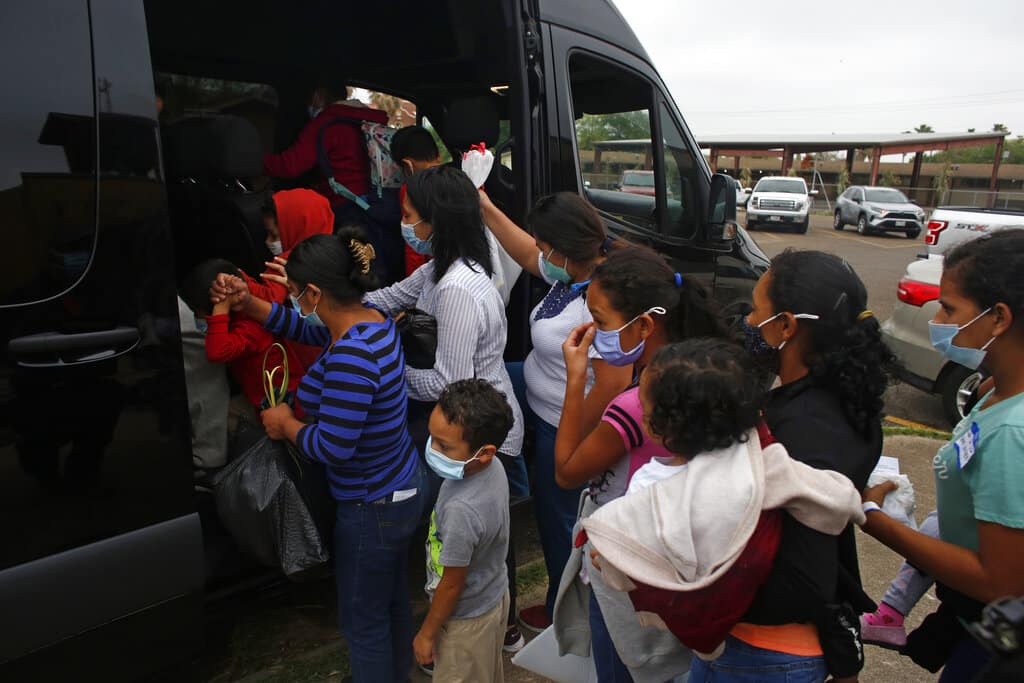Local communities are bearing a portion of the costs associated with helping migrants released from Border Patrol custody as they move to their U.S. destinations, but city leaders say the contribution is nominal, so far.
“I’ve heard out in the community about transportation out of the Valley. We are not doing that,” McAllen City Manager Roy Rodriguez said, clarifying misconceptions he’s heard.
Since Jan. 27, U.S. Border Patrol in the Rio Grande Valley began releasing certain migrant families seeking asylum in the United States. The vast majority who are released leave South Texas via bus or plane.
Cities with bus stations, shelters and nonprofit organizations ready to assist see the most releases like McAllen and Brownsville.
Transportation costs are divided in three steps. Migrants are first driven from federal custody and dropped off at bus stations or shelters. In cases of overflow or to provide overnight shelter, migrants are sometimes moved from a nonprofit site to another. Ultimately, a bus or plane ticket is purchased with the migrant’s U.S. destination.
A combination of resources between nonprofit organizations working alongside federal and local governments cover the overall expenses.
In McAllen, where the largest shelter operating with an overflow site receives migrants daily, the transportation costs are greater for the local government than in Brownsville.
“The latest estimate that I have of what we’ve spent on transportation is about $25,000 which should be reimbursable,” Rodriguez said.
Catholic Charities of the Rio Grande Valley’s Respite Center welcomes up to 600 people at a time, or half their prepandemic capacity. An additional site in Mission was opened this year to assist with overflow.
“Transportation is only there in our jurisdiction,” Rodriguez said, “to and from the respite center from time to time, or lately transportation to the Mission respite center because of the overflow requirement.”
While the nonprofit shoulders the greatest fiscal responsibility to feed, clothe, and temporarily shelter thousands of migrant adults and children, the city will provide assistance other than inter-Valley transportation.
During the statewide outages in Texas, McAllen Mayor Jim Darling said they helped the respite center by providing generators and heaters. They also cover the costs of setting up a tent and the associated electricity costs where migrants receive COVID testing, the mayor also stated.
“We do not pay for bus tickets or airline tickets, or anything else. That’s paid by, for the most part, by the immigrants themselves,” Rodriguez said. Some nonprofits also provide financial assistance to migrants who struggle to buy those tickets.
In Brownsville, the federal government drops migrants off near or at the bus station. Felipe Romero, the city’s public information officer, said the city does not provide transportation to shelters. Instead, nonprofit organizations take that responsibility.
Some city employees are used to monitor the bus station and serve as liaisons to guide migrants waiting for their buses. However, Romero said they work during their normal hours and, therefore, do not acquire overtime.
Reimbursements for funding used to pay migrant transportation in McAllen pose little concern for the city.
“Luckily, because it’s transportation and we’re funded by the Federal Transit Authority, FTA, those kinds of expenses are reimbursable and so that makes it easy. That part we’re not concerned with,” Rodriguez said. “It’s all the other expenses that we’re concerned about. Whenever we have personnel or equipment.”
About $115 million in federal funds through the Emergency Food and Shelter National Board Program are dedicated to reimburse cities, counties and non-governmental organizations providing aid to migrants, but it’s blocked in Texas by Gov. Abbott who said he prefers the money is sent to increase detention at federal agencies.
U.S. Rep. Henry Cuellar, D-Laredo, said he’s working to find a path around the state, a measure that could potentially provide quicker financial relief to local governments and non-governmental organizations.





